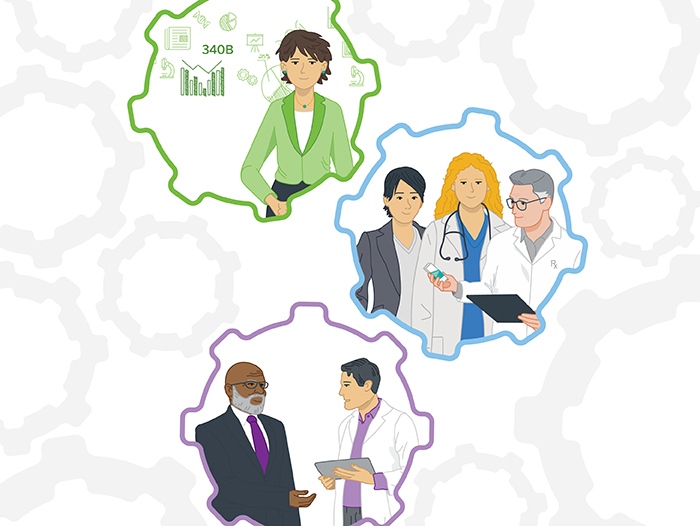Auto logout in seconds.
Continue LogoutA new genetic test may reveal a child's risk of obesity well before symptoms begin. Developed using genetic data from more than 5 million people, the tool offers early insight into risk during early childhood.
Study details
For the study, which was published in Nature Medicine, researchers from 500 institutions — working under the Genetic Investigation of Anthropometric Traits (GIANT) Consortium — analyzed the genomes of more than 5 million people. The study was led by scientists at the University of Copenhagen's Novo Nordisk Foundation Center for Basic Metabolic Research (CBMR) in collaboration with 23andMe.
Researchers developed a polygenic risk score (PGS), a tool that aggregates the effects of thousands of genetic variants associated with body mass index (BMI) and fat storage.
"What makes the score so powerful is its ability to predict, before the age of five, whether a child is likely to develop obesity in adulthood, well before other risk factors start to shape their weight," said Roelof Smit, the study's lead author and assistant professor at CBMR.
The new PGS significantly improves on earlier genetic screening tools. According to NBC News, the new score explains up to 17.6% of a person's risk of developing obesity in adulthood — more than double the predictive power of the next-best method, which accounted for just 8.5%.
"This new polygenic score is a dramatic improvement in predictive power and a leap forward in the genetic prediction of obesity risk," said Ruth Loos, a professor at CBMR. "[It] brings us much closer to clinically useful genetic testing."
However, performance varied widely across racial and ethnic groups. The test explained only 2.2% of obesity risk in rural Ugandans and about 16% in East Asian Americans. According to NBC News, roughly 70% of the genetic data used in the study came from people of European ancestry. About 14% were Hispanic, 8% were East Asian, and just under 5% were of predominantly African ancestry.
"The next step is to collect more — and more diverse — data on people with African ancestry in particular," Loos said. Broader representation will be essential to make the score more accurate for all populations.
"This new polygenic score is a dramatic improvement in predictive power and a leap forward in the genetic prediction of obesity risk"
Researchers also examined how individuals with high genetic risk responded to lifestyle interventions. Those with higher risk scores were more likely to benefit from diet and exercise — but were also more likely to regain weight once those interventions ended. "Those with higher genetic risk respond better to weight loss interventions but may regain weight quickly," the study authors note.
Still, genetics alone do not determine outcomes. "Obesity is not only about genetics, so genetics alone can never accurately predict obesity," Loos said. "For the general obesity that we see all over the world, we need other factors such as lifestyle that need to be part of the predictions.”
Commentary
Researchers hope the new tool can help identify children at elevated risk before weight-related complications set in — similar to how high blood pressure readings can flag cardiovascular risk. "[T]he score could offer one indicator — what high blood pressure is to heart disease, for example — that could help predict a person’s risk of developing obesity," Loos said.
"Childhood is the best time to intervene," Loos added. Research shows that 55% of children with obesity go on to have obesity in adolescence — and 80% of those teens will carry it into adulthood.
Roy Kim, a pediatric endocrinologist at Cleveland Clinic Children's, said the score is useful but far from comprehensive.
"That's a pretty powerful risk indicator for obesity, but it still leaves open a lot that is unknown," Kim said. "Even with the same genetic makeup, people can have different body types."
According to Kim, more than 80% of a person's obesity risk is driven by environmental and behavioral factors. "Their environment, their access to healthy food, exercise opportunities, even their knowledge about healthy foods all affect a person's obesity risk," he said.
Advisory Board's weight management resources
For more resources on current treatments and approaches to weight management and prevention, Advisory Board offers the following:
- This expert insight outlines the five biggest questions about weight-management drugs and their answers.
- Similarly, this expert insight addresses what headlines get wrong about weight-management drugs and what healthcare leaders should know instead.
- Radio Advisory's Rachel Woods has also covered GLP-1 drugs on the podcast, discussing the potential future of these drugs and how they could help — or hurt — health systems' finances.
- Other useful resources include this expert insight on the five catalysts that will impact the future of obesity care and this research on four key elements of comprehensive obesity care.
- Our weight management and obesity care resource library can also help leaders understand the current care landscape, manage innovations, and prepare for transformations in care.
Juliana Simonetti, codirector of the Comprehensive Weight Management Program at the University of Utah, has been using genetic tests with her adult patients for several years. "Obesity is not homogeneous. We have different kinds and different presentations," she said.
Genetic testing can be helpful for identifying people who struggle with satiety — those who eat but don't feel full.
People who have these mutations "tend to have higher weight," Simonetti explained. But that's just one piece of a much larger picture. "The genes that a person inherits from either parent, even if they are not mutations, also determine how a person's body stores weight or uses energy," she said.
Genetics may also influence treatment effectiveness. "We are talking about three out of 80 mutations that we can treat," Simonetti noted. "We are getting better, and the more data we have, I'm hopeful that we are going to do a better job in being more precise in understanding treatment responses."
(Sullivan, NBC News, 7/21; Smit, et al., ScienceDaily, 7/25)
Don't miss out on the latest Advisory Board insights
Create your free account to access 1 resource, including the latest research and webinars.
Want access without creating an account?
You have 1 free members-only resource remaining this month.
1 free members-only resources remaining
1 free members-only resources remaining
You've reached your limit of free insights
Become a member to access all of Advisory Board's resources, events, and experts
Never miss out on the latest innovative health care content tailored to you.
Benefits include:
You've reached your limit of free insights
Become a member to access all of Advisory Board's resources, events, and experts
Never miss out on the latest innovative health care content tailored to you.
Benefits include:
This content is available through your Curated Research partnership with Advisory Board. Click on ‘view this resource’ to read the full piece
Email ask@advisory.com to learn more
Click on ‘Become a Member’ to learn about the benefits of a Full-Access partnership with Advisory Board
Never miss out on the latest innovative health care content tailored to you.
Benefits Include:
This is for members only. Learn more.
Click on ‘Become a Member’ to learn about the benefits of a Full-Access partnership with Advisory Board
Never miss out on the latest innovative health care content tailored to you.


